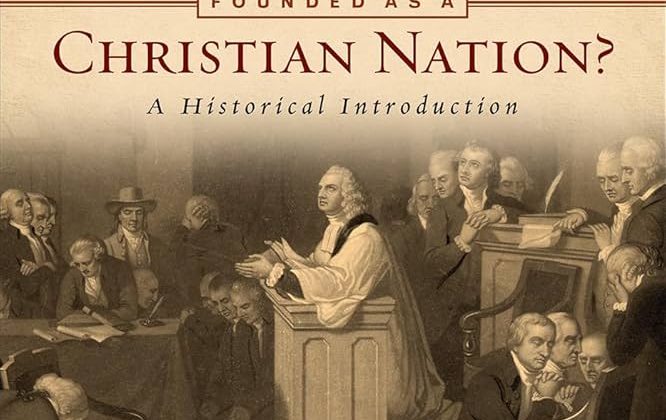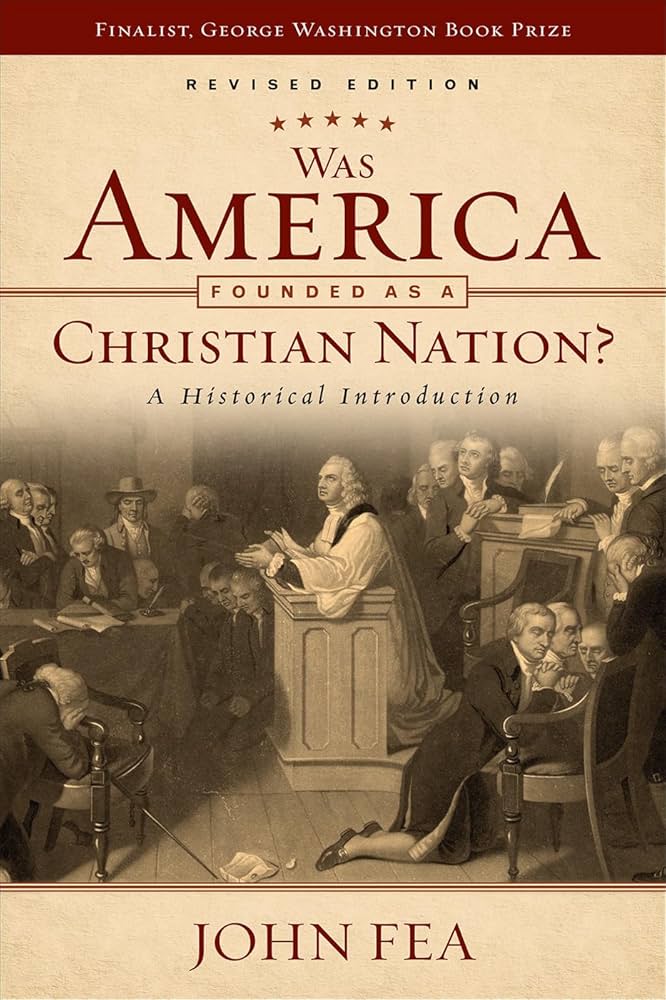

Short answer: No.
Short nuanced answer: Sometimes Christian values can overlap with American values.
Was America founded as a Christian nation?: No
Was Christianity important to the founding generation and did the founders believe that Christianity was good for the republic that they founded? Yes.
Is there a book that helps us better understand these issues? Yes.
Is there a book that helps us better think about how to use the past in the present? Yes.
Here are Pamela Paul’s thoughts on the subject in the context of the recent Louisiana 10 Commandments decision:
Whenever a politician cites “Judeo-Christian values,” I find it’s generally followed by something unsettling.
Last month brought two flagrant instances. In both cases, Republican officials introduced state laws that formalize precepts of the Christian nationalist movement — in the words of the National Association of Christian Lawmakers (A.D. 2019), “doing everything we can to restore the Judeo-Christian foundation of our nation.”
On June 19, Gov. Jeff Landry of Louisiana signed legislation requiring public classrooms to display the Ten Commandments, a practice struck down as unconstitutional by the Supreme Court in 1980. A rich endorsement came via Donald Trump, who crowed, “I LOVE THE TEN COMMANDMENTS IN PUBLIC SCHOOLS, PRIVATE SCHOOLS, AND MANY OTHER PLACES, FOR THAT MATTER. READ IT — HOW CAN WE, AS A NATION, GO WRONG???”
One week later, Landry’s fellow Christian soldier Ryan Walters, Oklahoma’s superintendent of public instruction, announced plans to mandate teaching the Bible in public schools. Walters said learning the Bible is necessary to having “an understanding of the basis of our legal system.”
Forgive me for wondering: Is he referring to “an eye for an eye” or the stoning of disobedient children?
Either way, for both Trump and true believers, it hardly matters that the First Amendment was intended to protect religion from the state, not to have the state impose a religion. (So much for originalism.) Their goal is to impose one form of religion, Christianity, and the underlying message is that those who do not share it will have to submit.
Not only have such moves been declared unconstitutional (“I can’t wait to be sued,” Landry said), but they are also exclusionary and offensive to many.
Despite what the Christian nationalist movement would have you believe, America was not founded as a Christian nation. Nor is it one today. In a pluralistic country, neither the Bible nor Judeo-Christian values are universal, including in the two heavily Christian Southern states in which these laws were passed.
In Louisiana, for example, 2 percent of residents are adherents of other faiths — including Islam, Buddhism, Judaism and Hinduism. Thirteen percent are religious nones, including 4 percent who are atheist or agnostic. In Oklahoma, a similar percentage follow non-Christian religions, and an even larger portion — 18 percent — adhere to no religion.
Read the rest at The New York Times.
I am still confused about what the Louisiana government thinks will happen when the Ten Commandments are placed in school classrooms in 2025. Will the words on the poster somehow radiate a wave of spirituality into the minds and souls of students sitting in Louisiana classrooms? If that “wave of spirituality” is the Holy Spirit (the third person of the Christian Trinity) are we to assume that the Holy Spirit does not have the power to do its work without a Ten Commandment’s poster? I am reminded here of the 19th-century American Bible Society. The leaders of this benevolent society believed that if you just put the Bible in the hands of people, without commentary or preaching, the Bible would “do its work” in converting lost souls and building a Christian civilization. Learn more about the American Bible Society here.
Some are arguing that the Ten Commandments must be posted in Louisiana schools not for spiritual reasons, but historical ones. This argument is based on the belief that the United States was founded on Judeo-Christian principles. It is hard to argue with the fact that the Judeo-Christian tradition played some role in shaping the moral commitments of many, if not all, of the founders. But it is also very hard to make an argument that the Judeo-Christian tradition was the only intellectual or moral tradition that informed the founding. I don’t see any laws requiring Louisiana schools to post excerpts of the John Locke’s Second Treatise on Government, the works of Montesquieu or Rousseau, or some of the ancient Greek and Roman political writers. In the end, this is all political. It has nothing to do with history or education.
Pamela Paul writes: ‘Whenever a politician cites ‘Judeo-Christian values’, I find it’s generally followed by something unsettling.”
Here is how I would amend her statement: “Whenever a politician cites ‘Judeo-Christian values,’ it is too often followed by something that does not sound very ‘Judeo-Christian’.”
UPDATE: July 5, 2024, 7:44AM: Historian David Waldstreicher takes things one step further:
Right you are, John. This is not about restoring Judeo-Christian values. It is about power. They have the power to place documents of their religion in classrooms. Nothing else will change. You would think that the Sermon on the Mount which includes the Beatitudes would be more Christian than the Ten Commandments. They, after all, are Jesus’ interpretation of the Commandments. But those Christian values are not the values of these Christian nationalists. I am reminded of the fact that although Italian public schools are secular, there is a Crucifix in every classroom. The result has not been a strengthening of the Catholic faith in Italy. But it is a reminder of the power of the church.
Not to mention that “Judeo-Christian” is a fictional category; there is nobody who identifies as a “Judeo-Christian.” If you look at the ideals and agendas promoted as “Judeo-Christian,” they almost never line up with the beliefs or goals of actual Jews. It is a category used solely by certain kind of Christian to provide a semblance of ecumenical legitimacy to a purely sectarian agenda.
Does anyone happen to know where the text in the Louisiana law came from? It seems to be the same as on the 1950s monuments that were distributed by the Fraternal Order of Eagles in conjunction with Cecil B. DeMille’s Ten Commandments movie, and it’s largely taken from the KJV, but not entirely. The closest match that I’ve been able to find is an English translation of Luther’s Small Catechism, which seems like a peculiar source.
You can find the mandated text in the bill: https://legiscan.com/LA/text/HB71/id/2920274
Oh, and does Trump know about the 7th commandment (6th in traditions, like mine, that follow Augustine’s numbering)?
I think that I have an answer to my own question. According to Kevin Kruse’s One Nation Under God (p. 145), “The [Fraternal Order of Eagles] had been distributing copies of the Ten Commandments for years, inspired by an incident in which Judge E. J. Ruegemer of St. Cloud, Minnesota, learned that a juvenile defendant in his courtroom had never heard of the laws and “sentenced” the boy to learn and obey them. Ruegemer, the head of the Eagles’ Youth Guidance Commission, persuaded the fraternal order to take up the cause. Members and their
families volunteered to make reproductions of the Ten Commandments, initially manufacturing them as paper scrolls in St. Paul and framing them with hand-cut wood and glass.”. If there’s anyplace in America where Luther’s Small Catechism wouldn’t be out of the ordinary, it would be in that part of Minnesota.